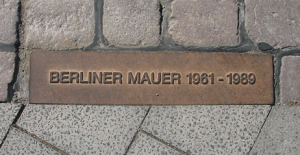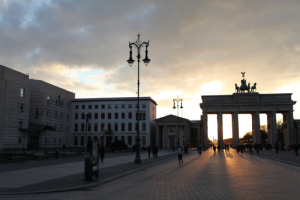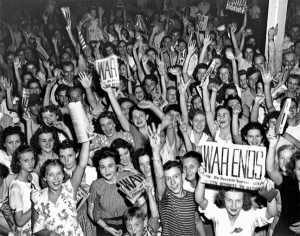75 years ago, the world sighed in relief. After six gruesome years and over 70 million lost lives, World War II was finally over. May 8, 1945, marked both the end of a ruthless regime and the war in Europe. The Allied Forces had brought the German Wehrmacht to its knees, and at 11:01 p.m., the war in Europe was officially over. In the U.S. and the UK, the day is celebrated as “Victory in Europe Day,” and for decades, May 8 (and in some cases May 9) has been a holiday in various European countries – but not in Germany. However, for its 75th anniversary, the Day of Liberation has been declared a one-time holiday in Berlin.
Tag Archives: Remembrance
Personal Recollections: The Fall of the Wall Part Two
This week’s installment concludes our series on the fall of the Berlin Wall. Enjoy!

Bobbie Kirkhart, Los Angeles
When I was very young, I imagined there was a wall just beyond my view, making sure I could not venture into the forbidden world. It made a strange shape, surrounding all the territory I could explore and blocking everywhere I could not. Perhaps it was that I was by far the youngest in my family, so that everyone else was an adult in my eyes and therefore free. Whatever the reason, I accepted as simple truth that I was banned from a world where everyone else was free to go. As I grew older, I realized that the wall was a metaphor, but I saw it as no less a reality in my life.
I was well into my 40s when that changed.
Personal Recollections: The Fall of the Wall

Marlena Voigts, Hamburg
Nov. 9, 1989: I was lying in bed when I thought I heard the phone ring. The next morning, there was in fact a message on my answering machine from about 3 a.m. “Hi Marlena! You won’t believe where I am. (Pause) I’m in the West, at my Aunt’s house in West Berlin! It’s just unbelievable!”
Remembering the Fall of the Wall
In honor of the 30thanniversary of the fall of the Berlin Wall, the American Studies Blog will remember this spectacular event in history through the eyes of people from around the world during the next few weeks.

When Everything Changed
“Your friend Jörg called. There’s something going on at the border.” “What border, the Hungarian?” I was taking off my coat thinking of the pictures I’d seen of Hungarian border patrols cutting the wire fence and letting East Germans through only a few months before. “He said you should turn on the TV.” And so I did, and there they were, the celebrating Berliners climbing on top of the wall, welcoming stunned East Berliners, joined in delirious joy for the first time in four decades. And here I was, almost 7,000 kilometers away in Ann Arbor, Michigan, where I’d been teaching for the last four years.







